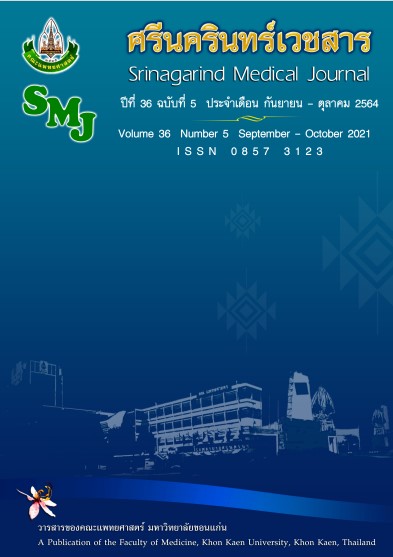ผลของโปรแกรมสร้างเสริมสมรรถนะแห่งตนต่อพฤติกรรมการดูแลของผู้ดูแลผู้สูงอายุสมองบาดเจ็บไม่รุนแรงหลังจำหน่ายกลับบ้านและกลุ่มอาการภายหลังสมองบาดเจ็บ
Abstract
Effects of the Self-Efficacy Enhancing Program on the Practice Behavior of Caregivers for the Older Patients with Mild Traumatic Brain Injury after Discharge and Post-concussion Syndrome
Supapon Rooplor1*, Mayuree Leethong-in2, Sirimart Piyawattanapong2
1Master degree of Gerontological Nursing, Faculty of Nursing, Khon Kaen University.
2Gerontological Nursing, Faculty of Nursing Khon Kaen University
*Corresponding author: Supapon Rooplor, Master Degree Student, Master of Nursing Science Program in Gerontological Nursing, Faculty of Nursing, Khon Kaen University. E-mail: supaponr@kku.ac.th
หลักการและวัตถุประสงค์ : ผู้สูงอายุสมองบาดเจ็บไม่รุนแรงหลังจำหน่ายกลับบ้านมีอัตราการเสียชีวิตที่เพิ่มสูงขึ้นผู้ดูแลจึงมีบทบาทสำคัญ การศึกษานี้ จึงมีวัตถุประสงค์เพื่อศึกษาผลของโปรแกรมสร้างเสริมสมรรถนะแห่งตนต่อพฤติกรรมการดูแลของผู้ดูแลผู้สูงอายุสมองบาดเจ็บไม่รุนแรงหลังจำหน่ายกลับบ้านและกลุ่มอาการภายหลังสมองบาดเจ็บ
วิธีการศึกษา: เป็นการศึกษาวิจัยกึ่งทดลอง แบบ 2 กลุ่มวัดผลหลังการทดลอง กลุ่มตัวอย่างคือ ผู้ดูแลผู้สูงอายุสมองบาดเจ็บไม่รุนแรงที่มารับบริการที่หอผู้ป่วยอุบัติเหตุและฉุกเฉิน 2 จำนวน 56 ราย แบ่งเป็น 2 กลุ่มเท่ากันคือกลุ่มละ 28 ราย กลุ่มทดลองได้รับโปรแกรมสร้างเสริมสมรรถนะแห่งตน กลุ่มควบคุมได้รับการพยาบาลตามปกติ เครื่องมือที่ใช้ ได้แก่ 1) แบบสัมภาษณ์พฤติกรรมการดูแลของผู้ดูแลและกลุ่มอาการภายหลังสมองบาดเจ็บในช่วง 48 ชั่วโมง และ 2) แบบสัมภาษณ์พฤติกรรมการดูแลของผู้ดูแลและกลุ่มอาการภายหลังสมองบาดเจ็บในช่วง 2 สัปดาห์ วิเคราะห์ข้อมูลโดยใช้สถิติ Independent t-test และ Mann-Whitney U test
ผลการศึกษา: ในช่วง 48 ชั่วโมงและ 2 สัปดาห์ หลังสมองบาดเจ็บพบว่า คะแนนพฤติกรรมการดูแลของผู้ดูแลกลุ่มทดลองมากกว่ากลุ่มควบคุมอย่างมีนัยสำคัญทางสถิติ (p <.05) และผู้สูงอายุของกลุ่มทดลองมีกลุ่มอาการภายหลังสมองบาดเจ็บแตกต่างจากของกลุ่มควบคุมอย่างมีนัยสำคัญทางสถิติ (p <.05)
สรุปผล:โปรแกรมสร้างเสริมสมรรถนะแห่งตนทำให้ผู้ดูแลมีพฤติกรรมการดูแลผู้สูงอายุสมองบาดเจ็บไม่รุนแรงหลังจำหน่ายกลับบ้านเพิ่มขึ้นและลดการเกิดกลุ่มอาการภายหลังสมองบาดเจ็บ
คำสำคัญ: สมรรถนะแห่งตน; ผู้ดูแล; ผู้สูงอายุสมองบาดเจ็บไม่รุนแรง; กลุ่มอาการภายหลังสมองบาดเจ็บ
Background and Objective: The older patients with mild traumatic brain injury (mTBI) after being discharged, have a higher mortality rate. The caregiver plays an important role. The purposes of this study were to examine the effects of the self-efficacy enhancing program on the practice behavior of caregivers for the older patients with mTBI after discharge and post-concussion syndrome.
Methods: The study was a quasi-experimental research two groups posttest design. The fifty-six participants who were caregivers for the older patients with mTBI at Accident and Emergency Ward 2 which divided into a control group and intervention group equally. The experimental group received the self-efficacy enhancing program while the control group received a usual care program. The instruments used were 1) the practice behavior of caregivers and post-concussion syndrome in the older patients during 48 hours questionnaire and 2) the practice behavior of caregivers and post-concussion syndrome in the older patients during 2 weeks questionnaire. Data were analyzed using Independent t-test, and Mann-Whitney U test.
Results: The results for 48 hours and 2 weeks after brain injury showed that the experimental group gained scores on the practice behavior of caregivers higher than those of control group at level of significance (p <.05). Also, it was indicated that the older patients with mTBI in the experimental group had post-concussion syndrome differences from those who were in the control group at level significant (p <.05).
Conclusions: The program can be used to increase caregivers’behavior in caring of the older with mTBI in order and reduced the post-concussion syndrome after discharged.
Keyword: Self-Efficacy; Caregivers; Older Patients with Mild Traumatic Brain Injury; Post-Concussion Syndrome


